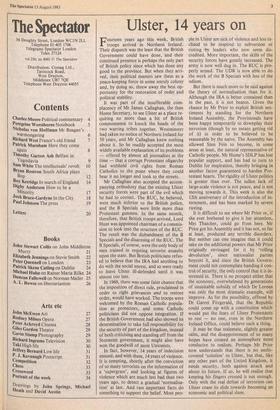Ulster, 14 years on
Fourteen years ago this week, British troops arrived in Northern Ireland. Their dispatch was the least that the British Government could have done, and their continued presence is perhaps the only part of British policy since which has done any good to the province. But when they arri- ved, their political masters saw them as a peace-keeping force in some unruly colony and, by doing so, threw away the best op- portunity for the restoration of order and political stability.
It was part of the insufferable com- placency of Mr James Callaghan, the then Home Secretary, to see Ulster as a place re- quiring no more than a bit of British commonsense to knock the, heads of the two warring tribes together. Westminster had taken no notice of Northern Ireland for 50 years, and Mr Callaghan knew nothing about it. So he readily accepted the most widely available explanation of its problems — offered by almost all journalists at the time — that a corrupt Protestant oligarchy had withheld civil rights from Roman Catholics to the point where they could bear it no longer and took to the streets, Mr Callaghan also accepted the accom- panying orthodoxy that the existing Ulster security forces were part of the evil which he had to correct. The RUC, he believed, were much inferior to the British police, and the B Specials were little more than Protestant gunmen. In the same month, therefore, that British troops arrived, Lord Hunt was appointed chairman of a commis- sion to look into the structure of the RUC. The result was the disbandment of the B Specials and the disarming of the RUC. The B Specials, of course, were the only body of men trained in resisting terrorist assaults upon the state. Butbritish politicians refus- ed to believe that the IRA had anything to do with the social unrest, and so were ready to leave Ulster ill-defended until it was almost too late.
In 1969, there was some faint chance that the imposition of direct rule, proclaimed in order to right grievances and to restore order, would have worked. The troops were welcomed by the Roman Catholic popula- tion as protectors, and some Catholic politicians did not oppose integration. If the British Government had also showed its determination to take full responsibility for the security of part of the kingdom, instead of both criticising and standing off from the Stormont government, it might also have won the goodwill of most Unionists.
In fact, however, 14 years of indecision ensued, and with them, 14 years of violence. It is tempting, shortly after the conviction of so many terrorists on the information of a 'supergrass', and looking at figures of violence which are much less bad than two years ago, to detect a gradual 'normalisa- tion' at last. And two important facts do something to support the belief. Most peo- ple in Ulster are sick of violence and less in- clined to be inspired to subversion or rioting -by leaders who now seem dis- credited. More important, the skills of the security forces have greatly increased. The army is now well dug in. The RUC is pro- perly armed. The UDR is now able to do the work of the B Specials with less of the odium.
But there is much more to be said against the theory of normalisation than for it. Although the IRA is better contained than in the past, it is not beaten. Given the chance by Mr Prior to exploit British sen- timents by standing for the Northern Ireland Assembly, the Provisionals have been happy temporarily to downplay their terrorism (though by no means getting rid of it) in order to be believed to be reasonable by the naive. The Assembly has allowed Sinn Fein to become, in some areas at least, the natural representative of Catholic people. Mr Hume's SDLP has lost popular support, and has had to turn to Dublin for inspiration, thereby bringing in another factor guaranteed to harden Pro- testant hearts. The rigidity of Ulster politics is greater than ever. The sullen lack of large-scale violence is not peace, and is not moving towards it. This week is also the 12th anniversary of the introduction of in- ternment, and has been marked by severe rioting.
It is difficult to see where Mr Prior or, if she ever bothered to give it her attention, Mrs Thatcher, could go from here. Mr Prior got his Assembly and it has not, so far at least, produced any terrible disorders. But neither can one imagine that it could take on the additional powers that Mr Prior originally envisaged for it by 'rolling devolution', since nationalist parties boycott it, and since the British Govern- ment could not contemplate handing it con- trol of security, the only control that it is in- terested in. There is no prospect either that the economy, overwhelmed by generations of unsuitable subsidy of which De Lorean was only the most dramatic example, will improve. As for the possibility, offered by Dr Garret Fitzgerald, that the Republic could come up with a constitution which would put the fears of Ulster Protestants to rest — no one, even in the Northern Ireland Office, could believe such a thing.
It may be that stalemate, slightly greater calm, and the disappointment of so many hopes have created an atmosphere more conducive to realism. Perhaps Mr Prior now understands that there is no undis- covered 'solution' to Ulster, but that, like any other part of the United Kingdom, it needs security, both against attack and about its future. If so, he will realise that keeping his fingers crossed is not enough. Only with the real defeat of terrorism can Ulster cease its slide towards becoming an economic and political slum.






































 Previous page
Previous page